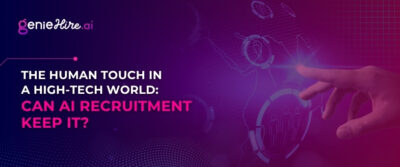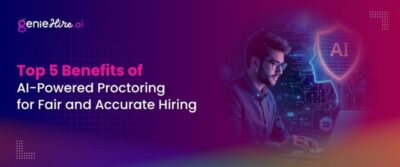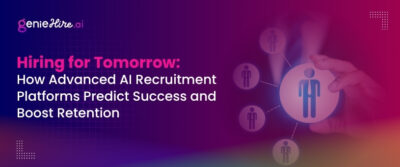Introduction:
In a rapidly evolving job market, the pressure on HR professionals to hire the right talent faster and more effectively is higher than ever. Traditional recruitment methods often rely on intuition and outdated metrics, leading to inefficiencies and biased decisions. Enter AI analytics in recruitment – a revolutionary approach that empowers HR teams to make smarter, faster, and more informed hiring decisions.
This blog explores how AI-driven insights are reshaping the hiring landscape by enabling data-backed strategies.
What is AI Analytics in Recruitment?
AI analytics in recruitment refers to the use of artificial intelligence and machine learning algorithms to process vast amounts of recruitment data and generate actionable insights. Unlike traditional methods that depend on manual data interpretation, AI analytics automate the analysis of resumes, social profiles, interview data, and historical hiring patterns to deliver intelligent recommendations.
These insights help HR professionals understand what works in their hiring process and identify areas of improvement. For instance, AI can flag resumes that closely match successful employees’ profiles or predict the likelihood of a candidate accepting a job offer. Such precision enables HR teams to make decisions that are not only faster but also more aligned with organizational goals.
Key Benefits of Using AI Analytics in Recruitment
Improved Quality of Hire
By analysing historical hiring data and employee performance metrics, AI systems can pinpoint characteristics and qualifications that correlate with high-performing hires. This allows recruiters to prioritize candidates who are more likely to succeed in the role.
Faster Time-to-Hire
AI reduces manual tasks like resume screening and interview scheduling. With automation handling repetitive tasks, recruiters can focus on engaging with the most promising candidates sooner, significantly shortening the hiring cycle.
Enhanced Candidate Experience
AI tools like chatbots and automated email responses ensure timely and consistent communication. Candidates receive updates, scheduling options, and feedback faster, creating a more engaging and respectful recruitment experience.
Reduced Hiring Bias
One of the most compelling benefits of AI analytics is its ability to minimize unconscious bias. By focusing solely on data, AI ensures that hiring decisions are based on qualifications and relevant experience, promoting a more equitable selection process.
Essential Recruitment Metrics Powered by AI
Candidate Conversion Rate
This metric tracks how many candidates move from one stage of the hiring funnel to the next. AI can identify drop-off points and suggest optimizations to improve conversion at each stage.
Time to Fill
AI analyses historical data to predict how long it will take to fill specific roles. It can also recommend strategies to accelerate the process, such as targeting different job boards or adjusting job descriptions.
Cost per Hire
By tracking expenses across various channels and campaigns, AI tools help HR teams understand where their recruitment budget is being most effectively spent. Insights into ROI allow for better resource allocation.
Employee Retention Predictions
AI models can analyse new hire data alongside long-term performance and retention metrics to forecast whether a candidate is likely to stay. This predictive capability helps reduce turnover and improve workforce planning.
How HR Leaders Can Implement AI Analytics in Recruitment
Audit Your Current Hiring Process
Begin by mapping out your existing recruitment workflow. Identify bottlenecks, gaps in data collection, and areas where automation could save time or improve outcomes.
Choose the Right AI-Driven Recruitment Platform
Select a solution that integrates seamlessly with your Applicant Tracking System (ATS), provides customizable dashboards, and offers predictive analytics. Platforms like GenieHire.ai are tailored for such purposes.
Train Your HR Team
The value of AI insights depends on your team’s ability to interpret and act on them. Invest in training that enhances data literacy among HR professionals to ensure meaningful application.
Ensure Ethical and Compliant Use of AI
AI systems must be transparent, explainable, and fair. Ensure that your AI tools comply with data protection regulations and avoid discriminatory outcomes through regular audits and monitoring.
Real-World Example: How Companies Use AI Analytics to Improve Hiring
Consider a mid-sized tech company struggling with high turnover rates among junior developers. By implementing AI analytics, they reviewed past hiring data, performance reviews, and exit interviews. The AI revealed that candidates from certain bootcamps with specific soft skills had higher retention rates. This insight helped the company refine its screening process, improve job descriptions, and target the right candidate pools – ultimately reducing turnover by 30% over a year.
Future Trends in AI Analytics for HR and Recruitment
Predictive Hiring Models
Advanced AI systems are being developed to not only evaluate past data but to forecast future hiring needs and talent gaps.
Real-Time Feedback Loops
AI is increasingly capable of providing real-time feedback during the hiring process, helping HR teams make agile adjustments to improve outcomes.
Integration with Workforce Planning Tools
Future AI platforms will be tightly integrated with workforce and succession planning tools, offering a holistic view of talent management.
Conclusion: Embracing AI Analytics for Smarter Hiring
AI analytics in recruitment is not just a technological advancement – it’s a strategic shift toward precision and efficiency in hiring. By leveraging data intelligently, HR leaders can improve hiring quality, accelerate processes, and build stronger, more resilient teams. As the technology matures, its role in shaping the future of recruitment will only become more central.
To learn more about how AI is transforming recruitment practices, read our blog: Smarter Hiring with the Power of AI in Recruitment




